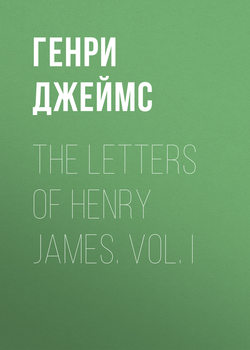Читать книгу The Letters of Henry James. Vol. I - Генри Джеймс, Henry Foss James - Страница 26
II
PARIS AND LONDON
(1875-1881)
To Miss Grace Norton
ОглавлениеThe 'short novel' he was now just finishing was Confidence
3 Bolton St., W.
Sunday a.m., June 8th [1879].
My dear Grace,
It is difficult to talk to you about my impressions—it takes a great deal of space to generalise; and (when one is talking of London) it takes even more to specify! I am afraid also, in truth, that I am living here too long to be an observer—I am sinking into dull British acceptance and conformity. The other day I was talking to a very clever foreigner—a German (if you can admit the "clever")—who had lived a long time in England, and of whom I had asked some opinion. "Oh, I know nothing of the English," he said, "I have lived here too long—twenty years. The first year I really knew a great deal. But I have lost it!" That is getting to be my state of mind and I am sometimes really appalled at the matter of course way of looking at the indigenous life and manners into which I am gradually dropping! I am losing my standard—my charming little standard that I used to think so high; my standard of wit, of grace, of good manners, of vivacity, of urbanity, of intelligence, of what makes an easy and natural style of intercourse! And this in consequence of my having dined out during the past winter 107 times! When I come home you will think me a sad barbarian—I may not even, just at first, appreciate your fine points! You must take that speech about my standard with a grain of salt—but excuse me; I am treating you—a proof of the accusation I have brought against myself—as if you were also a dull-eyed Briton. The truth is I am so fond of London that I can afford to abuse it—and London is on the whole such a fine thing that it can afford to be abused! It has all sorts of superior qualities, but it has also, and English life, generally, and the English character have, a certain number of great plump flourishing uglinesses and drearinesses which offer themselves irresistibly as pin-cushions to criticism and irony. The British mind is so totally un-ironical in relation to itself that this is a perpetual temptation. You will know the things I mean—you will remember them—let that suffice. Non ragioniam di lor!—I don't suppose you will envy me for having dined out 107 times—you will simply wonder what can have induced me to perpetrate such a folly, and how I have survived to tell the tale! I admit that it is enough for the present, and for the rest of the summer I shall take in sail. When the warm weather comes I find London evenings very detestable, and I marvel at the powers of endurance of my fellow "factors," as it is now the fashion to call human beings—(actors—poor blundering unapplauded Comedians would be a better name). Would you like a little gossip? I am afraid I have nothing very lively in hand; but I take what comes uppermost. I am to dine tonight at Sir Frederick Pollock's, to meet one or two of the (more genteel) members of the Comédie Française, who are here just now, playing with immense success and supplying the London world with that invaluable boon, a topic. I mean the whole Comédie is here en masse for six weeks. I have been to see them two or three times and I find their artistic perfection gives one an immense lift out of British air. I took with me one night Mrs. Kemble, who is a great friend of mine and to my sense one of the most interesting and delightful of women. I have a sort of notion you don't like her; but you would if you knew her better. She is to my mind the first woman in London, and is moreover one of the consolations of my life. Another night I had with me a person whom it would divert you to know—a certain Mrs. Greville (a cousin, by marriage, of the Greville Papers:) the queerest creature living, but a mixture of the ridiculous and the amiable in which the amiable preponderates. She is crazy, stage-struck, scatter-brained, what the French call extravagante; but I can't praise her better than by saying that though she is on the whole the greatest fool I have ever known, I like her very much and get on with her most easily.... I am just finishing a short novel which will appear presently in six numbers of Scribner. This is to say please don't read it in that puerile periodical (where its appearance is due to—what you will be glad to hear—large pecuniary inducements,) but wait till it comes out as a book. It is worth being read in that shape. I have asked you no questions—yet I have finished my letter. Let my blessing, my tender good wishes and affectionate assurances of every kind stand instead of them. Divide these with Charles, with your mother, with the children, and believe me, dear Grace, always very faithfully yours,
H. JAMES jr.
